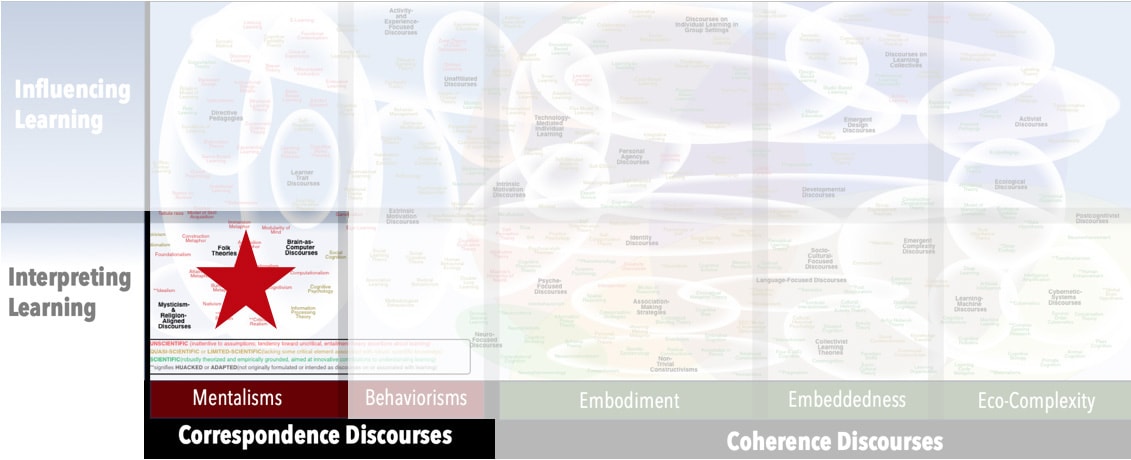AKA
Domain-Specific Learning
Domain Specificity
Functional Specialization
Localization of (Brain) Function
Focus
Interpreting human learning in terms of specialized brain regionsPrincipal Metaphors
- Knowledge is … scope of possible actions and interpretations
- Knowing is … appropriate coordination of brain modules
- Learner is … brain
- Learning is … exercising of brain modules
- Teaching is … module-targeted activities
Originated
1980sSynopsis
Modularity of Mind is a principle embraced across a number of theories of learning, asserting that the brain has a modular structure. Opinions vary on the extent of its modularity, but they tend to converge around the commitments that (1) those modules are rooted in the evolution of the species (i.e., they are mainly biologically determined) and (2) each module has a distinct function (which is useful for accounting for differences in aptitudes and abilities across individuals). Discourses that cover similar territory include:- Faculty Psychology (Mental Faculties) – both a theory and domain of study, grounded on the assumption that the mind is parsed into discrete, innate “faculties,” each of which is assigned specific tasks – such as perception, attention, judgment, intelligence, empathy, and memory.
- Phrenology – a pseudoscience that regards the shape of, the size of, and bumps on the skull are indicators of mental competencies and personality traits – all oriented by the assumption that the brain has localized, specific functions.
- Bicameral Mind (Julian Jaynes, 1970s) – a widely disputed theory about a mode of awareness hypothesized to having preceded the emergence of consciousness several thousand years ago. Jaynes theorized that instead of the modern experience of consciousness as an internal dialogue, people with a Bicameral Mind experienced “auditory hallucinations” – that is, they heard voices, which they took to be those of authorities or deities.
- General Learning Model (Douglas Gentile, 2010s) – an attempt at an integrated and holistic model of human learning, oriented by the principle that each type of learning involves a collection of domain-specific biological structures and cognitive mechanisms that can interact with one another in different ways
- Mental Discipline Theories (Mental Discipline Theories of Teaching) (various, ancient) – those perspectives on teaching that embrace the principle that the main purpose of education a specific content area is not to enable the mastery of that subject, but to develop general intelligence, train generalizable skills, instill cultural values, and support productive attitudes – that is, to discipline one’s mind
- Triune Brain (Paul MacLean, 1960s) – a widely disputed hypothesis that the human brain evolved through processes of adding structures to a Reptilian Brain. Three complexes were posited, each of which is seen to have its own functions and mode of consciousness:
- Reptilian Brain (Reptilian Complex; R-Complex; Lizard Brain) – brain structures seen as responsible for instinctive behaviors
- Paleomammalian Brain (Paleomammalian Complex; Mammalian Brain) – that set of brain structures responsible for the motivation and emotion, especially in relation to familial associations
- Neomammalian Brain (Neomammalian Complex) – those brain structures associated with language, abstract reasoning, social relationships, and planning
- Three Brains – a widely disputed hypothesis that humans have three centers of cognition, based on the realization that there are complex neuronal structures around the heart and the gut:
- Cephalic Brain – the head/mind, seen as the site of abstract thinking, intelligence, creativity, consciousness
- Cardiac Brain – the heart, seen as the site of intuition, emotion, values, compassion, courage
- Enteric Brain – the gut, seen as the site of mood management, instinct, self-preservation impulses
Commentary
The most condemning criticism of the notion of Modularity of Mind is its tendency to conflate “mind” and “brain.” Of course, human minds are entirely dependent on human brains, but they cannot be reduced to nervous systems. Minds arise in and give rise to social and cultural systems, and so represent at least on major leap in complexity. Regarding the specific assertion on brain modularity, Neuroscience has demonstrated the brain areas do specialize, but it is also apparent that there are variations from one person to the next and from one culture to the next. Other discourses (e.g., Neuroconstructivism) offer different accounts on the origins and roles of emergent module-like structures.Authors and/or Prominent Influences
Jerry FodorStatus as a Theory of Learning
Modularity of Mind is a theory of brain structure, but it can be (and has been) positioned as a theory of learning. In particular, toward the end of the 20th century, it was frequently cited as an explanatory principle in discourses devoted to learning disabilities and intelligence.Status as a Theory of Teaching
Modularity of Mind is not a theory of teaching, but it figures prominently in discussions ofStatus as a Scientific Theory
Proponents of Modularity of Mind tend to adopt – uncritically – Cognitivism’s grounding metaphor of “brain as computer.” As well, while there is ample evidence to support the assumption of specialization of brain regions, it would appear that proponents of Modularity of Mind tend to dramatically over-estimate the role of biology and under-estimate the role of situation, resulting in assertions that are out of line with the evidence.Subdiscourses:
- Bicameral Mind
- Cardiac Brain
- Cephalic Brain
- Enteric Brain
- Faculty Psychology (Mental Faculties)
- General Learning Model
- Mental Discipline Theories (Mental Discipline Theories of Teaching)
- Neomammalian Brain (Neomammalian Complex)
- Paleomammalian Brain (Paleomammalian Complex; Mammalian Brain)
- Phrenology
- Reptilian Brain (Reptilian Complex; R-Complex; Lizard Brain)
- Triune Brain
Map Location

Please cite this article as:
Davis, B., & Francis, K. (2024). “Modularity of Mind” in Discourses on Learning in Education. https://learningdiscourses.com.
⇦ Back to Map
⇦ Back to List
